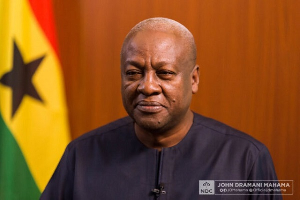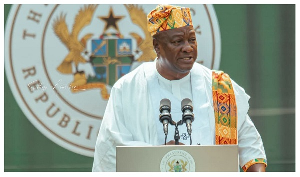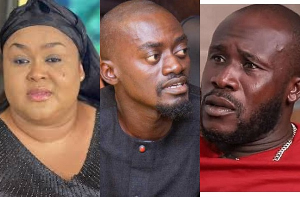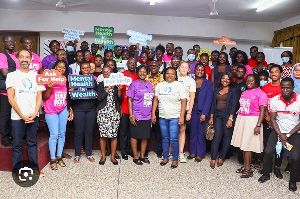On November 24, 2004, Ghanaweb reported a call from the Minister of Defense for a medical school to be established on the campus of the University of Ghana at Legon. The minister was speaking at the 25th anniversary of the Noguchi Memorial Institute for Medical Research (NMIMR), and reportedly made the remarks in response to a call to relocate the medical school to the campus of the university.
The call included a relocation of all ?medical institutions under the University at the Korle-Bu Teaching Hospital to the Legon campus of the University.? The only clear reason presented for moving the medical school to Legon was that it ?would help cut down on the cost of commuting from Korle-Bu to Legon.? This in addition to the fact that ?Legon campus would offer a serene atmosphere,? supposedly for medical education. The arguments presented in the short news article fail to take into account an important reason why the medical school is located at Korle-Bu, patients. While the speakers focus on reducing the cost of commuting from the university to the medical school, they fail to recognize the cost of bringing patients to the new medical school campus if it school be relocated to Legon, and the impact on accessibility of health services.
It would seem from the call, that after relocation, the only services left at Korle-Bu would be patient care, with little or no medical education, or research taking place there. In this regard, the call appears to have been made without much thought or planning. One of the greatest resources in medical education is the patient, and a call to move medical education from the source of a major resource in medical education is at best unfortunate.
Notwithstanding my criticism above, I believe the call for relocating the medical school to the Legon campus is timely. I do not support a call to MOVE medical school institutions away from Korle-Bu. Rather, I would support a call, and indeed, I would call for the establishment of a university medical center on the campus of the University of Ghana. This would be in addition to the teaching facilities at Korle-Bu.
Why is there a need for a new university based medical center?
The idea of a medical center at Legon is part of a larger development and economic plan that Ghana should develop that will focus on the greater African community. In short, a reputable university hospital at the University of Ghana will become a destination for quality healthcare for much of Africa, and an education resource for other African countries that do not have the quality of healthcare, or educational facilities to train their own doctors. In other words, students from countries like Namibia, Angola, Equatorial Guinea, and any countries with no medical school will send their students to Ghana for training. Governments will sponsor their students through bilateral agreements with the government of Ghana. These same governments will send their officials needing specialty healthcare to the (hopefully highly rated) University of Ghana Medical Center instead of sending them to Europe or America at much higher cost. Private individuals who can afford it may come from other countries to seek healthcare in Ghana, again at comparable quality, but less cost compared to Europe or America.
Feasible? Yes.
Besides political will and a real commitment to development, the greatest impediment to such a program would be cost. However, with careful planning, cost is not an insurmountable impediment. The cost of a new university medical center should be borne by private and public contributions, and very little government contribution. Who should contribute to such a project? Aggressive fundraising should be sought from all students who have been educated at public expense at the existing medical schools, especially those who have left the country. In addition, public fundraising should be sought through independent lotteries, raffles, and other similar means. Private contributions should be sought from local corporations as well as multinationals operating in Ghana. The biggest source of funding for the university medical center should be through contracts. While I believe that a project such as I propose can be realized without government budgetary allocation, I also believe that a small government contribution will be necessary so as not to completely exclude government from the project, so that government can still claim ownership.
Funding will be as such: 1. Government ? 5% 2. Private corporations ? 30% 3. Public (old students, raffles, etc.) ? 25% 4. Contracts ? 40%
The first three funding sources listed are quite self-explanatory; as such I will dwell briefly on #4. The government of Ghana will contract with oil-rich African countries (not Nigeria) to train their students in the health sciences at Ghanaian medical institutions including the medical schools, nursing schools, and reputable institutes such as Noguchi. For the privilege of coming to study in Ghana, the governments in question will contribute an upfront amount to build the new medical center at Legon. Part of the money involved will be a retainer fee that will provide access. That means, a certain number of students from these countries will be guaranteed admissions to Ghanaian medical institutions, for a certain number of years. At the end of the contract period, at which time the hospital would have been completed, the Ghana government agrees to help these countries establish their own medical schools, and hospitals. Ghana would provide the planning and logistics, and these countries would finance the projects with their oil money. If at the end of the contract period these countries are not able to finance their own medical schools, their students may still attend Ghanaian medical schools, but with no special privileges or guarantees. Besides contracting with other African countries, the government of Ghana, through its proxy, would contract with pharmaceutical companies for the development of herbal pharmaceuticals from Ghana?s vast forestry resources. Patient based clinical research would be another source of contracting revenue to support the project.
There are some potential problems to contend with, such as continuity through changing governments. Such a problem can be avoided by parliamentary legislation to establish an independent commission to run the project. The term of commission members should overlap elections for continuity. Political will to risk such a novel project in an untested and risky manner will also be key.
This paper is presented as a concept paper, and the scope is too limited to discuss in detail the many potential questions that come up. It is part of the ?New Nkrumahism? brainstorm of ideas to move Ghana into a new age of economic development with a focus on Africa.



















